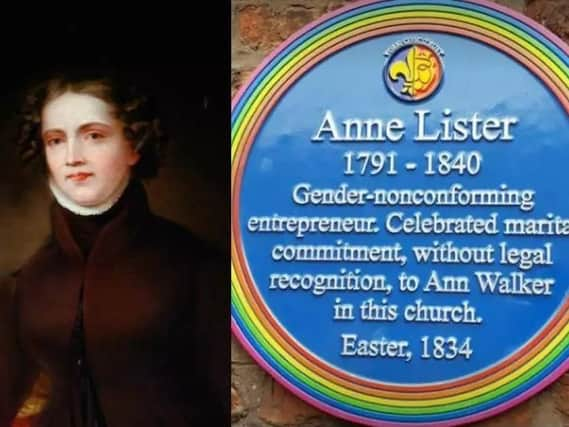The blue plaque honouring Anne Lister, the '˜first modern lesbian', is to change following complaints


The tribute for the 19th century diarist was unveiled on July 24 at Holy Trinity Church in York.
It was there that Lister, a wealthy landowner, received the church’s blessing to privately contract a marriage to Ann Walker on 30 March 1834.
Advertisement
Hide AdAdvertisement
Hide AdBut Lister was described on the commemorative plaque as “gender-nonconfirming”, which led to accusations that those behind the plaque had “erased” her sexuality from history.
An online petition set up by Julie Furlong urged York Civic Trust to rethink how Lister was presented.
“This [the unveiling] is a wonderful moment, except that the plaque calls Anne (an iconic figure to lesbians throughout West Yorkshire particularly) ‘gender non conforming’,” Ms Furlong said.
Lesbian icon
“A gender nonconforming woman can be many things because it only means that you do not conform to societal expectations. It has nothing to do with sexuality.
Advertisement
Hide AdAdvertisement
Hide AdAnne Lister was, most definitely, gender nonconforming all her life. She was also, however, a lesbian.
“Don’t let them erase this iconic woman from our history”.
In response, York Civic Trust, together with the Churches Conservation Trust, York LGBT Forum, and York LGBT History Month, agreed to “change the wording”.
The trust told BBC Yorkshire: “The plaque is intended to be a positive celebration of the union of Anne Lister and Ann Walker, and this remains the case.
“The last thing we wanted to do was to cause offence or upset to any community.”
No offence intended
Advertisement
Hide AdAdvertisement
Hide AdMs Furlong said she was happy with the decision, but was eager to find out exactly what would instead be written on the plaque.
Lister lived at Shibden Hall in Halifax, West Yorkshire, which she inherited from her uncle James Lister.
She was called ‘Fred’ by her lover and was known as ‘Gentleman Jack’ by Halifax residents.
Lister kept several volumes of detailed diaries. In them, she documented her sexual relationships with other women, which she wrote about in a code she devised herself. She thought her combination of algebra and the Greek alphabet would not ever be cracked – but it was.
This article appeared on our sister title the i newspaper on September 3